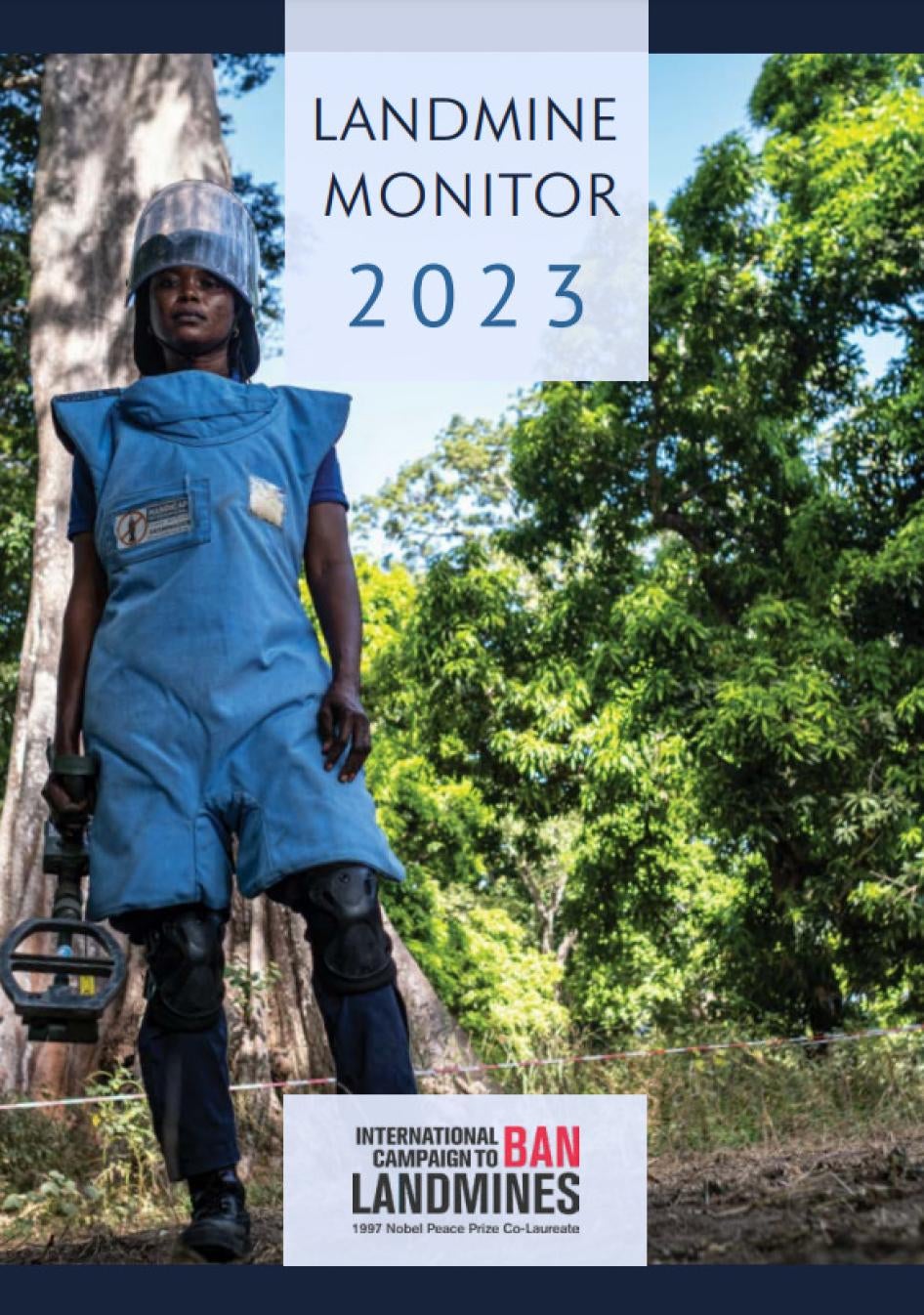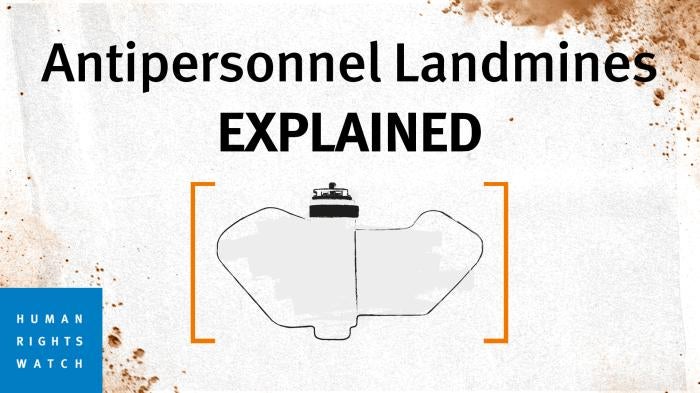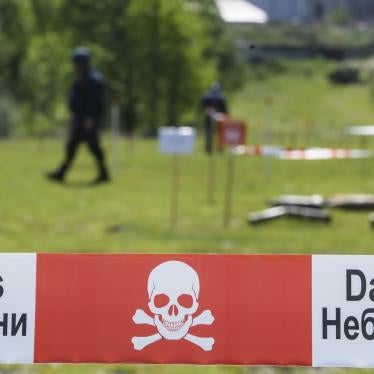- Russia, Myanmar, and Ukraine have used antipersonnel landmines in the past year, and armed groups used them in at least five countries, according to the annual report Landmine Monitor 2023.
- Antipersonnel mines are victim-activated explosive devices that kill and maim people both during and long after conflicts.
- Countries that have yet to prohibit antipersonnel landmines should reconsider their position and join the international treaty banning them.
(Geneva, November 14, 2023) – Russia, Myanmar, and Ukraine have used antipersonnel landmines in the past year, and armed groups used them in at least five countries, Human Rights Watch said today in releasing Landmine Monitor 2023, the annual report about the international treaty to ban landmines.
The 120-page Landmine Monitor 2023 is the product of the International Campaign to Ban Landmines, the global coalition of nongovernmental organizations chaired by Human Rights Watch that received the 1997 Nobel Peace Prize. Landmine Monitor 2023 will be presented at the Mine Ban Treaty’s annual meeting, held at the United Nations in Geneva from November 20 to 24.
“All countries that have not banned antipersonnel mines should help put an end to the casualties and suffering caused by these indiscriminate weapons,” said Mark Hiznay, associate arms director at Human Rights Watch and an editor of Landmine Monitor 2023. “Only through universal adherence can the Mine Ban Treaty achieve its goal of a world without antipersonnel mines.”
Russia has used antipersonnel landmines repeatedly in Ukraine since its full-scale invasion of the country on February 24, 2022, creating an unprecedented situation in which a country that is not party to the Mine Ban Treaty is using the weapon on the territory of a treaty party. Myanmar’s armed forces have used antipersonnel landmines continuously since 1999. Ukrainian authorities said in September that they are investigating the circumstances of its forces’ use of antipersonnel mines in and around the city of Izium, in Kharkiv province, in 2022, when the city was under Russian control.
Non-state armed groups used antipersonnel mines in at least five countries—Colombia, India, Myanmar, Thailand, and Tunisia—during the reporting period in mid-2022 and the first half of 2023. This new use mostly involved victim-activated improvised explosive devices made from locally available materials. The Mine Ban Treaty prohibits all victim-activated explosive devices regardless of whether they were improvised from local materials or produced in a factory.
Antipersonnel mines are explosive devices that kill and maim people both during and long after conflicts. They are placed above, under, or on the ground and explode from a person’s presence, proximity, or contact. Antipersonnel mines cannot distinguish between a soldier and a civilian. They are typically placed by hand, but they can also be scattered by aircraft, rockets, and artillery or dispersed from specialized vehicles. Uncleared landmines pose a danger until cleared and destroyed. Mined land can drive displacement of the civilian population, hinder the delivery of humanitarian aid, and prevent agricultural activities.
The Mine Ban Treaty, adopted in September 1997, comprehensively prohibits antipersonnel mines and requires countries to destroy stockpiles, clear mine-affected areas, and assist victims. A total of 164 countries are party to the treaty including all NATO members, except the United States. No country has joined the Mine Ban Treaty since Palestine and Sri Lanka did so in 2017. In June 2022, President Joe Biden set the US goal of ultimately joining the Mine Ban Treaty and realigned US policy with most of the treaty’s core prohibitions. Countries that have yet to prohibit antipersonnel landmines should reconsider their position and join the international treaty banning them, Human Rights Watch said.
Other major findings from Landmine Monitor 2023 include:
- There were at least 4,710 new casualties from landmines and explosive remnants of war in 51 countries in 2022, including 1,661 deaths;
- Syria, not a state party, recorded the highest number of annual casualties in 2022 (834) for the third consecutive year. Ukraine recorded the second highest number of casualties (608) followed by Yemen, a state party along with Ukraine, and Myanmar, not a state party, which each recorded more than 500 casualties in 2022;
- Civilians made up 85 percent of all recorded casualties in 2022, while children accounted for half of civilian casualties where the age was recorded;
- In 2022, global support for mine action including mine clearance and victim assistance totaled US$798.4 million, an increase on the $543.5 million provided in 2021. Ukraine headed the list of recipients in 2022, receiving $162.3 million;
- Since the Mine Ban Treaty came into force on March 1, 1999, 33 states party have completed the clearance of all antipersonnel mines from their territory;
- A total of 219.31 kilometers of contaminated land was cleared in 2022, resulting in the destruction of 169,276 antipersonnel mines;
Under the Mine Ban Treaty, 94 states party have collectively destroyed more than 55 million landmines from their stockpiles. Sri Lanka was the last state party to destroy its stocks in October 2021. Greece and Ukraine both possess stocks of antipersonnel mines but did not destroy any in 2022 and the first half of 2023. Greece said in June that it was transferring its remaining stocks to Croatia, where they would be destroyed over the next 18 months. Ukraine reported that storage sites where its 3.3 million PFM-series antipersonnel mines were once held had come “under air and missile attack” by Russia or were located in territories where fighting had occurred. Ukraine has requested time to conduct an audit and verification of the stocks.
“The prohibitions on antipersonnel mines that are enshrined in the Mine Ban Treaty are being put to the test, especially through the use of improvised explosive devices by non-state armed groups,” Hiznay said. “Governments should ensure that adequate resources are devoted to carrying out the requirements of the Mine Ban Treaty so that the benefits of joining are clear to all.”










